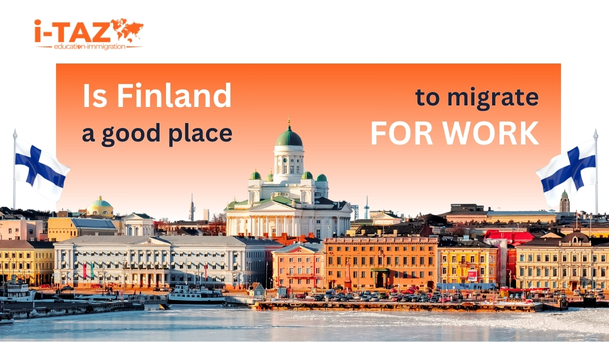Migrating to a new country for work involves evaluating various factors, and Finland stands out as a promising destination. With its high quality of life, innovative job market, and strong social support systems, Finland offers numerous advantages for expatriates. This comprehensive guide will explore why Finland is a favorable option for work, delve into the specifics of obtaining a Finland work visa, and provide insights into life in this Nordic country.

Why Finland?
1. High Quality of Life
Finland is frequently lauded for its exceptional quality of life. Finnish cities, such as Helsinki, Tampere, and Turku, offer a clean, safe, and well-organized environment. The country’s healthcare system is renowned for its efficiency and accessibility, providing high-quality medical care without excessive costs. Education in Finland is highly valued, with free schooling available at all levels, including higher education. This makes Finland an attractive destination for professionals with families.
The Finnish lifestyle emphasizes community and environmental consciousness. Public spaces are meticulously maintained, and there is a strong commitment to sustainability. This focus on a balanced and healthy lifestyle extends into the work environment, where there is a notable emphasis on work-life balance.
2. Strong Job Market
Finland boasts a resilient and diverse economy with significant opportunities in various sectors, including technology, engineering, healthcare, and education. The country is known for its innovation and technological advancements, which makes it an ideal location for professionals in these fields. Companies in Finland, ranging from startups to large enterprises, are actively seeking skilled workers, creating a vibrant job market with numerous prospects.
The technology sector in Finland is particularly noteworthy. Helsinki, for example, is a major hub for tech startups and digital innovation. Companies in software development, data science, and information technology frequently seek talented professionals. Furthermore, the Finnish government supports entrepreneurship, facilitating the establishment of new ventures and attracting international professionals.
3. Work-Life Balance
Finnish work culture is distinguished by its commitment to work-life balance. Employees in Finland typically enjoy reasonable working hours and generous vacation time. This approach helps reduce stress and enhance job satisfaction. Flexible working arrangements are common, and there is a general respect for personal time, which contributes to a healthier and more fulfilling work environment.

Navigating Finland’s Work Visa and Permit System
For those interested in working in Finland, understanding the work visa and permit process is crucial. Here’s a detailed overview of what you need to know:
1. Finland Work Visa
To work in Finland, you must obtain a Finland work visa, which is part of the Finnish residence permit system. The type of visa required depends on the nature of your employment and the length of your stay. Generally, you’ll need a job offer from a Finnish employer before applying for a work visa. The process involves submitting various documents, including proof of employment, qualifications, and personal identification.
2. Finland Work Permit
In addition to a work visa, you’ll need a work permit in Finland. The permit allows you to live and work in the country legally. The application process typically involves proving that you have a valid job offer, meeting specific qualifications for your role, and sometimes demonstrating language proficiency or other relevant skills. The Finnish Immigration Service (Migri) handles work permit applications, and their website provides detailed guidance on the requirements and application procedures.
3. Types of Work Permits
There are several types of work permits available in Finland, each tailored to different employment situations. For example:
- Employment-Based Residence Permit: For individuals with a specific job offer from a Finnish employer.
- For those planning to start their own business in Finland.
- Intra-Corporate Transfer Permit: For employees being transferred within a multinational company.
Each type of permit has specific requirements and application procedures, so it’s essential to choose the one that best fits your situation.
Living and Working in Finland
1. Cost of Living
The cost of living in Finland is relatively high compared to some other countries, particularly in major cities like Helsinki. However, this is balanced by the high quality of life and strong social services. Housing, transportation, and food costs are notable, but the overall standard of living, including healthcare and education, justifies these expenses for many expatriates.
2. Social Benefits
Finland offers a comprehensive social welfare system that includes benefits such as universal healthcare, parental leave, and unemployment benefits. These social benefits contribute to a stable and secure living environment, which can be particularly appealing for expatriates.
3. Cultural Adaptation
Adjusting to life in Finland involves adapting to a new culture and language. While English is widely spoken in professional settings, learning Finnish or Swedish can enhance your experience and integration. Finnish society values punctuality, direct communication, and a strong work ethic. Embracing these cultural norms can help you navigate your new environment more smoothly.
4. Community and Support
Finnish cities often have expatriate communities and support networks that can assist with the transition. These networks can provide valuable information, social connections, and practical advice for settling into life in Finland. Engaging with these communities can help ease the adjustment process and provide a sense of belonging.

Conclusion
Finland presents a compelling option for professionals considering migration. Its high quality of life, robust job market, and emphasis on work-life balance make it an attractive destination. While the process of obtaining a work visa and permit requires careful planning and adherence to regulations, the benefits of living and working in Finland can outweigh the challenges. With a supportive social system, diverse job opportunities, and a commitment to a balanced lifestyle, Finland offers a promising environment for expatriates seeking new career prospects and a fulfilling life abroad.









